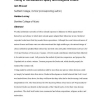Free Online Productivity Tools
i2Speak
i2Symbol
i2OCR
iTex2Img
iWeb2Print
iWeb2Shot
i2Type
iPdf2Split
iPdf2Merge
i2Bopomofo
i2Arabic
i2Style
i2Image
i2PDF
iLatex2Rtf
Sci2ools
MDAI
2007
Springer
2007
Springer
Voting in the Medieval Papacy and Religious Orders
We take institutions seriously as both a rational response to dilemmas in which agents found themselves and a frame to which later rational agents adapted their behaviour in turn. Medieval corporate bodies knew that they needed choice procedures. Although the social choice advances of ancient Greece and Rome were not rediscovered until the high middle ages, the rational design of choice institutions predated their rediscovery and took some new paths. Both Ramon Lull (ca 12321316) and Nicolaus of Cusa (a.k.a Cusanus; 1401-64) made contributions which had been believed to be centuries more recent. Lull promotes the method of pairwise comparison, and proposes the Copeland rule to select a winner. Cusanus proposes the Borda rule, which should properly be renamed the Cusanus rule. Voting might be needed in any institution ruled by more than one person, where decisions could not simply be handed down from above. Medieval theologians no doubt believed that God’s word was handed down from a...
| Added | 08 Jun 2010 |
| Updated | 08 Jun 2010 |
| Type | Conference |
| Year | 2007 |
| Where | MDAI |
| Authors | Ian McLean, Haidee Lorrey, Josep Colomer |
Comments (0)

